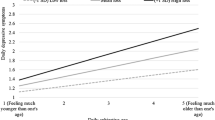Abstract
Perception of time is a concept that has interested gerontologists for many years, but why “time flies” as the years go by is not well understood. Two hundred and ninety-six institutionalized and community dwelling elderly (X=75.4 years) were administered a battery of psychological measures to test the relationship between emotional well-being and subjective speed of time. Faster time perceptions were associated with better psychological functioning—less clinical depression, enhanced sense of purpose and control, and “younger” perceived age—while the opposite perception held true for elders with time “on their hands.” Time also moved slower for many institutionalized elders. The clinical implications for treating older people in terms of utilizing their time more effectively and meaningfully are discussed.
Similar content being viewed by others
References
Kuhlen, R. & Monge, R. Correlates of estimated rate of time passage in adult years. J. Gero, 25:427–433, 1968
Salthouse, T., Wright, R. & Ellis, C. Adult age and the rate of an internal clock. J. Gero, 34:53–57, 1979
Lemlich, R. Subjective acceleration of time with aging. Percept Motor Skills, 41:235–238, 1975
Baum, S. & Boxley, R. Age denial-death denial in the elderly. Death Educ, in press
Aisenberg, R. What happens to old psychologists? A preliminary report. In Kastenbaum R. (Ed) New thoughts on old age. New York, Springer, 1964
Tuckman, J. Older person's judgment of the passage of time over the lifespan. Geriatrics 20:136–140, 1965
Surwillo, W. Age and the perception of short time intervals. J. Gero, 19:322–324, 1964
Lessing, E. Demographic, developmental and personality correlates of length of future time perspective (FTP). J. Pers, 36:183–201, 1968
Feifel, H. Judgments of time in younger and older persons. J. Gero, 12:71–74, 1957
Wallace, M. & Green, L. On age and the subjective speed of time. J. Gero, 16:71–74, 1961
Wallace, M. & Rabin, A. Temporal experience. Psychology Bull, 57:213–236, 1960
Knapp, R. & Garbutt, J. Time imagery and the achievement motive. J. Pers, 26:426–434, 1958
Neugarten, B. (Ed) Middle age and aging. Chicago, Univ. of Chicago, 1968
Rakowski, W. Future time perspective in later adulthood: Review and research directions. Exp Aging Res, 5:43–88, 1979
Neuringer, C. Levenson, M. & Kaplan, J. Phenomenological time flow in suicidal, geriatric and normal individuals. Omega, 2:247–251, 1971
Lefcourt, H. Locus of control: Current theory and research. Hildale NJ, Lawrence Erlbaum, 1976
Linn, M. & Hunter, K. Perception of age in the elderly. J. Gero, 34:46–52, 1979
Fink, H. The relationship of time perspective to age institutionalization and activity. J. Gero, 12:414–417, 1957
Hughes, E. Institutionalized older adults and their future orientation. J. Am Ger Soc, 27:130–134, 1979
Kahn R. Goldfarb, A. Pollack, M. Peck, A. Brief objective measures for the determination of mental status on the aged. Am J. Psychiat, 117:326–328. 1960
Gordon, R. Interviewing, strategy, techniques and tactics. Homewood Ill, Irwin-Dorsey, 1969
Derogatis, L. Cleary, P. Confirmation of the dimensional structure of the SCL-90 A study in construct validation. J. Clin Psycholog, 33:981–989, 1977
Crumbaugh, J & Maholcik, L. An experimental approach in existentialism: The psychometric approach to Frankl's concept of noogenic neuroses. J. Clin Psycholog 33: 20:200–207, 1964
Rotter, J. Generalized expectancies for internal versus external locus of control reinforcement. Psychol Monogr, 80:1–23, 1966
de Beauvoir, S. The coming of age. New York, Putnam, 1972
Author information
Authors and Affiliations
Additional information
This paper was presented at the Annual Convention of the American Psychological Association, Washington, D.C., August, 1982. The authors would like to thank Steven and Ricki Sharpe for their assistance in revising the manuscript. Reprint requests should be addressed to the senior author, Sunnybrook Hospital, Department of Psychology, 2075 Bayview Avenue, Toronto, M4N 3M5.
Rights and permissions
About this article
Cite this article
Baum, S.K., Boxley, R.L. & Sokolowski, M. Time perception and psychological well-being in the elderly. Psych Quart 56, 54–61 (1984). https://doi.org/10.1007/BF01324632
Issue Date:
DOI: https://doi.org/10.1007/BF01324632




